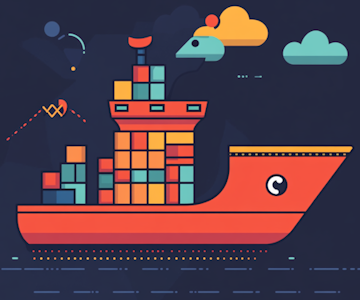Initial Load
Scripts are executed in alphabetical order, executed on MONGO_INITDB_DATABASE.
For Mongo <6 by mongo and by mongosh for mongo >=6.
See the Github Docker-Mongo Repository for these examples.
With JavaScript
Example compose.yaml file:
services:
mongo-js:
container_name: mongo-js-load
image: mongo
volumes:
- db-js:/data/db
- ./load-js:/docker-entrypoint-initdb.d
ports:
- "27009:27017"
environment:
MONGO_INITDB_DATABASE: jsapp
MONGO_INITDB_ROOT_USERNAME: ${MONGO_USER}
MONGO_INITDB_ROOT_PASSWORD: ${MONGO_PWD}
volumes:
db-js: {}
The .env file:
MONGO_USER=mongoadmin
MONGO_PWD=pwd
The load-js directory contains a load.js file:
db.celebrities.insertMany([
{ name: "Jon Skeet" },
{ name: "Martin Fowler" },
{ name: "Erich Gamma" }
]);
With Shell
services:
mongo-sh:
container_name: mongo-sh-load
image: mongo
volumes:
- db-sh:/data/db
- ./load-sh/scripts:/docker-entrypoint-initdb.d
- ./load-sh/data:/mongo-seed-jsons
ports:
- "27008:27017"
environment:
MONGO_INITDB_DATABASE: shapp
MONGO_INITDB_ROOT_USERNAME: ${MONGO_USER}
MONGO_INITDB_ROOT_PASSWORD: ${MONGO_PWD}
volumes:
db-sh: {}
In load-sh/data put your json files to be imported.
You can either already provide the ids in the json with "_id": { "$oid": "5bb0b3050581bf10c4bb89c3" } or omit the _id to have mongo create one for you.
In load-sh/scripts you can import the jsons with a .sh file:
# A json with an []
mongoimport --db $MONGO_INITDB_DATABASE
--collection celebrities
--jsonArray
--file /mongo-seed-jsons/celebrities.json
--authenticationDatabase admin
--username $MONGO_INITDB_ROOT_USERNAME
--password $MONGO_INITDB_ROOT_PASSWORD
# A json with a single {}
mongoimport --db $MONGO_INITDB_DATABASE
--collection socials
--file /mongo-seed-jsons/socials.json
--authenticationDatabase admin
--username $MONGO_INITDB_ROOT_USERNAME
--password $MONGO_INITDB_ROOT_PASSWORD
Mongo Shell
# With mongo-js-load the name of the container
# And jsapp the database name
docker exec -it mongo-js-load mongosh
--username mongoadmin
--password pwd
--authenticationDatabase admin
jsapp
In the shell:
db.celebrities.find()
use admin
show collections
exit
If you just want to bash into it:
docker exec -it mongo-js-load sh
mongod.conf
By default mongo will not load any conf file. If you want to work with a custom mongod.conf:
services:
mongo-conf:
container_name: mongo-conf
image: mongo
command:
- '-f'
- '/etc/mongod.conf'
volumes:
- db-conf:/data/db
- ./mongod.conf:/etc/mongod.conf
ports:
- "27007:27007"
environment:
MONGO_INITDB_ROOT_USERNAME: ${MONGO_USER}
MONGO_INITDB_ROOT_PASSWORD: ${MONGO_PWD}
volumes:
db-conf: {}
The container port is 27007 because of this mongod.conf:
net:
port: 27007
bindIp: 127.0.0.1
Inside the container check /etc/mongod.conf.orig for a basic one. Or if you have installed it locally:
| Platform |
Install Method |
Configuration File |
| Linux |
apt, yum or zypper |
/etc/mongod.conf |
| macOS |
brew |
/usr/local/etc/mongod.conf (Intel processor) |
|
|
/opt/homebrew/etc/mongod.conf (Apple M1 processors) |
| Windows |
MSI |
<install directory>binmongod.cfg |
Security
Get into the mongosh without credentials and then do everything in the shell itself.
See User Management Methods in the mongo docs for more!
docker exec -it mongo-secure mongosh
use admin
db.auth("mongoadmin", "pwd")
use otherDb
db.createUser({
user: 'otherDbReader',
pwd: 'pwd',
roles: [{
role: 'read',
db: 'otherDb'
}]
})
With Initial Load
In a js file. Mongo 6 supports process.env:
db.createUser({
user: 'user2',
pwd: process.env.USER2_PWD,
roles: [{
role: 'read',
db: 'someDb'
}]
})
Before mongo 6, use a sh file instead:
mongosh <<EOF
use $MONGO_INITDB_DATABASE
db.createUser({
user: '$OTHER_USER',
pwd: '$OTHER_PWD',
roles: [{
role: 'read',
db: '$MONGO_INITDB_DATABASE'
}]
})
EOF
Roles
The official docs for Built-In Roles.
| Role |
Description |
|
Database User Roles |
| read |
Read data on all non-system collections (+ system.js) |
| readWrite |
Can modify all collections from the read role |
|
Database Administration Roles |
| dbAdmin |
Schema-related tasks, indexing and gathering statistics |
| userAdmin |
Create and modify roles and users on the current db. Can grant any privilege to any user, including themselves (indirectly provides superuser to the db/cluster) |
| dbOwner |
Combines readWrite, dbAdmin and userAdmin |
| backup |
Minimal privileges for backing up data |
| restore |
Minimal privileges for restoring backups |
Other roles:
readAnyDatabase: the same as the roles above, but for all databases (also exists for readWrite, dbAdmin and userAdmin)clusterAdmin: clusterManager + clusterMonitor + hostManager (+ dropDatabase action)enableSharding: Enable sharding for a collection and modify existing shard keysroot: global superuser access: xxxAnyDatabase + clusterAdmin + backup/restore
Synology
If you run these examples on Synology, chances are they won’t work! You may see the following error:
WARNING: MongoDB 5.0+ requires a CPU with AVX (Advanced Vector Extensions) support, and your current system does not appear to have that!
Check here to see if yours has AVX. Basically all models from the 21+, 22+, 23+ 24+ series.
You’ll also run against a permissions issue when executing the js or sh files, which we’ll fix with a custom Dockerfile:
services:
mongo-synology:
container_name: mongo-syno-load
build:
context: ./load-syno
dockerfile: Dockerfile
volumes:
- db-syno:/data/db
ports:
- "27006:27017"
environment:
MONGO_INITDB_DATABASE: synoapp
MONGO_INITDB_ROOT_USERNAME: ${MONGO_USER}
MONGO_INITDB_ROOT_PASSWORD: ${MONGO_PWD}
volumes:
db-syno: {}
The load-syno/Dockerfile file:
# Last version without AVX:
FROM mongo:4.4.29
# Copy your sh file and adjust permissions:
COPY import.sh /docker-entrypoint-initdb.d
RUN chmod +x /docker-entrypoint-initdb.d/import.sh
CMD ["mongod"]

